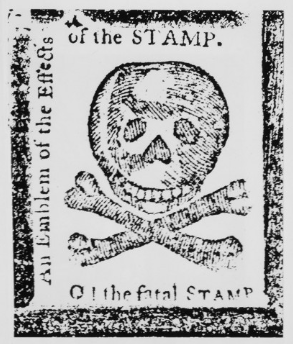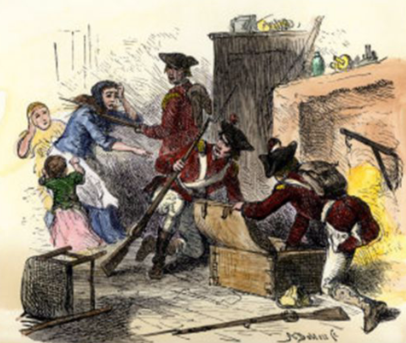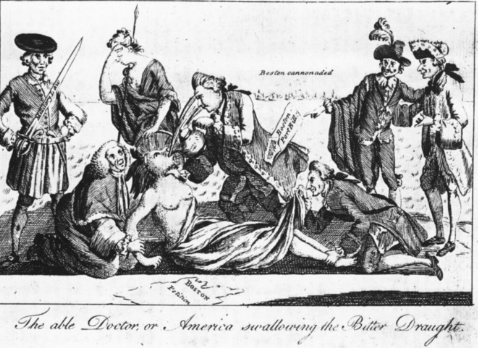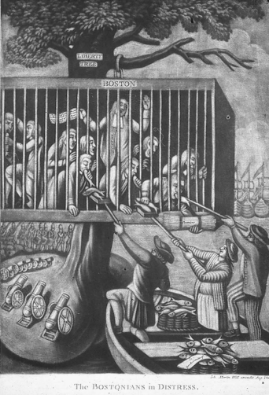Road to The Revolution
1/36
Earn XP
Description and Tags
Name | Mastery | Learn | Test | Matching | Spaced |
|---|
No study sessions yet.
37 Terms
being in a state or position of command or control over all others
dominance
Founding Father and the second President of the United States, known for his role in drafting the Declaration of Independence and his contributions to American independence and early government.
John Adams
a group of American colonists who protested British taxation and policies before the American Revolution, often through acts of protest and defiance.
The Sons of Liberty
a meeting of colonial representatives in 1774 to address grievances against British rule and to seek a peaceful resolution.
the first continental congress
a 1754 meeting of colonial representatives to discuss a unified colonial defense against French threats during the French and Indian War. It's known for proposing the Albany Plan of Union, a forerunner to the idea of American unity.
The Albany Congress
a 1770 incident where British soldiers in Boston fired on a crowd of colonists, killing several, during a tense confrontation. It fueled anti-British sentiments and contributed to the American Revolution.
The Boston Massacre
a British decree that prohibited American colonists from settling west of the Appalachian Mountains to avoid conflicts with Native American tribes.
Proclamation of 1763
reigned as the King of Great Britain and Ireland from 1760 to 1820. His reign was marked by the American Revolutionary War and periods of mental illness.
King George III
Who won the french and indian war?
The British, they gained control over New France
an unofficial British policy of non-enforcement of trade regulations on their american colonists during the 17th and 18th centuries.
salutary neglect
a form of tax, usually placed on important goods
duty
proudly housing for the military
quartering
colonists could not move farther west because of what?
The proclamation of 1763
how did the colonists react to the proclamation of 1763?
they protested, and were very angry about losing land. they continued to move west anyways.
banned paper money in the colonies because paper money lost value faster
Currency act (1764)
How did the colonists react to the currency act of 1764?
many protests against it, argued it would have a negative effect on the economy in the colonies
raised tax rates on imported molasses and raw sugar, as well as pimento, coffee, indigo, and silk
the sugar act (1764)
how did the colonists react to the sugar act?
boycotts and protests
taxed printed materials
the stamp act (1765)
How did the colonists react to the stamp act?
they created the stamp act congress, boycott of british goods, attacked stamp distributors, and forced Greenville from power in 1765.
colonists felt they should not be taxed because they did not get to elect anyone to parliament
“no taxation without representation”
What happened before March 5th, 1770?
The british introduced several taxes to the colonists
what did the colonists throw at the soldiers?
rocks, sticks, and snowballs
who was arrested at the boston massacre?
13 people, 8 being british soldiers and one officer
why did john adams represent the soldiers?
he wanted them to have a faiir trial
what was the outcome of the trial after the boston massacre?
6 soldiers were found not guilty and 2 were convicted of manslaughter
The intolerable acts included;
the boston port act, the massachusetts government act, the administration of justice act, the quartering act, and the quebec act
the unlawful use violence and intimidation, especially against civilians, in the pursuit of political aims.
terrorism
the quality of being patriotic; devotion to and vigorous support for one’s country
patriotism
to formally organize public opinion and coordinate patriotic actions against great britan
what was the purpose of the committees of correspondence
they emptied three ships worth and 342 chests of tea into the boston harbor in protest
what tactics did the sons of liberty use to resist british taxes before the american revolution
ten boxes of parchment paper and stamped paper were transported and burned. some simply refused to pay taxes.
how did the sons of liberty respond to the stamp act?
from a debate on the stamp act in parliament in 1765
where did the sons of liberty get their name

What act does this cartoon symbolize?
the stamp act

What act does this cartoon symbolize?
The quartering act

What act does this cartoon symbolize?
the tea act

What act does this cartoon symbolize?
the intolerable acts